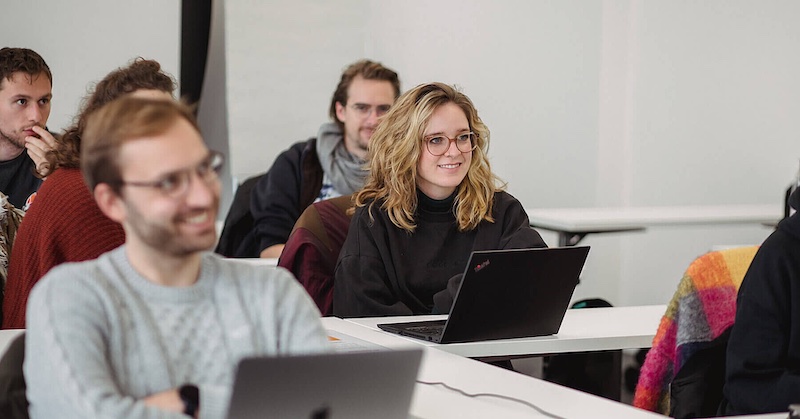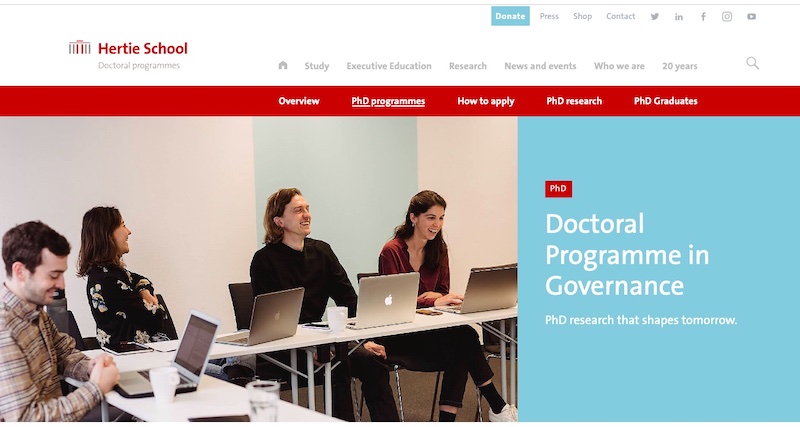Hertie School Doctoral Programme in Governance 2024/2025. Doctoral education at the Hertie School is organised as a structured programme.
During the first year, PhD researchers prepare for their research and thesis writing with dedicated methods, research design and skills seminars. During the following years, an increasing amount of time was allocated to independent work on the thesis.
Researchers regularly present their research findings at colloquia or international conferences. To connect with leading scholars in their field of studies they may undertake research stays abroad. Courses in the structured doctoral programme start in early September each year.
Read also: KidsRights International Children’s Peace Prize 2024.
Overview: The Hertie School Doctoral Programme in Governance 2024/2025.

Stipends:
The Hertie School does not charge tuition fees for its doctoral programmes. Each year we offer eight competitive three-year stipends of 1450 euros per month plus a monthly health insurance contribution of up to 200 euros.
PhD Workshops and Supports:
Throughout the doctoral journey, we offer seminars and workshops to our PhD researchers to enhance their methodological skills, support their thesis writing, develop their publishing and professional skills and support their career planning. PhD researchers will find a well-functioning support structure at the Hertie School. Further, each candidate works with a doctoral committee which eventually comprises three dissertation advisors who provide intellectual guidance and monitor the candidate’s research progress.
PhD researchers working with data science methods have the opportunity to develop their methodological skills throughout the doctoral journey with a dedicated PhD workshop on data science. Further, PhD researchers can get dedicated PhD training on methods and advanced theories and research from our faculty in so-called PhD mini-courses. Find out more about some of our current training and our support infrastructure here.
In addition, PhD researchers benefit from a wide array of doctoral training and workshops offered by our Berlin partner institutions and by the European network of leading universities in the social sciences within the CIVICA network.
Read also: Hanken Scholarships for Master’s Degree Program 2024.
Cooperation and Networks:
The Hertie School is part of a vibrant research hub and cooperates with Berlin’s world-class universities and research institutes. Our doctoral researchers benefit from a broad range of seminars and training offered by our partners and in our joint PhD programmes DYNAMICS, BGTS/ SCRIPTS and BSE. The Hertie School further closely cooperates with top PhD programmes in the social sciences in Europe in the context of the EU-funded CIVICA project: Bocconi University, Central European University (CEU), European University Institute (EUI), Sciences Po, Stockholm School of Economics, The London School of Economics (LSE) and National University of Political Studies and Public Administration (SNSPA).
The Hertie School attracts international scholars and practitioners to its activities, providing our researchers with opportunities to meet experts in their field of research.
Graduate Prospects:
Many of our PhD Graduates move into academic careers at leading universities worldwide. Further, Hertie School PhD Graduates undertake careers in international organisations and public institutions, many in research positions. You may find out more about our PhD Graduates here.
Read also: Guide to Migrating to Canada as a Fashion Designer with Visa Sponsorship..
Hertie School Doctoral Programme in Governance Curriculum.
Doctoral research
As of year one a substantial amount of time is allocated to independent work on the dissertation project. By the end of the first year, doctoral researchers will submit a dissertation prospectus to two PhD supervisors.
Academic training
In their first year, PhD researchers attend research design and methods training that support their dissertation research.
PhD researchers have the opportunity to receive dedicated training on methods or advanced theories with our faculty in Hertie’s PhD mini-courses. Further, PhD researchers working with data science methods have the opportunity to get training and support in the PhD workshop on data science that runs throughout their doctoral journey.
In addition to the training offered at the Hertie School, doctoral researchers benefit from a broad range of specific methods training offered by our partner universities in Berlin and within the CIVICA network, a network of leading European universities offering doctoral education in the social sciences. Further, doctoral researchers attend Summer and Winter Schools abroad.
Skills training
Doctoral research
An increasing amount of time is allocated to independent work on the dissertation project. PhD candidates will find a unique support structure for their research.
In the second and third year of their studies, PhD researchers present their research in one of the Hertie School’s research colloquia and at international conferences. They may undertake research stays at one of our partner universities:
Bocconi University (Italy), Central European University (Hungary), the European University Institute (Italy, European Intergovernmental Organization), Sciences Po (France), the Stockholm School of Economics (Sweden), London School of Economics (UK), National University of Political Studies and Public Administration (RO) or at other universities abroad.
Each candidate works with a doctoral committee which eventually comprises three dissertation advisors who provide intellectual guidance and monitor the candidate’s research progress.
Skills training
PhD researchers may choose from a wide range of skills workshops to support the planning of the doctoral journey and develop their academic and professional skills. More information is available on our PhD training and support page.
Finish – Next career step:
PhD researchers may choose from a wide range of workshops to support the planning of their next career step.
Read also: Diamond Trust Bank Graduate Management Trainee Program 2024.
How to apply to the Hertie School Doctoral Programme in Governance 2024.
Who should apply
We are interested in applicants with an exceptionally strong master’s degree (or equivalent) in economics, law, political science, sociology, public administration, management, and data science or related fields. The master’s degree should be completed before you enter the programme.
When to apply
The application deadline depends on how you apply to the Doctoral Programme in Governance for the 2024 cohort (starting September 2024). You may apply to the programme via both application procedures.
Apply for a PhD stipend
Each year the Hertie School awards eight three-year PhD stipends of 1,450 Euros per month plus a monthly health insurance contribution of up to 200 Euros. The deadline to apply for a Doctoral Programme in Governance stipend is 31 January 2024.
Apply with external funding
If you intend to secure external funding through the DAAD or a German foundation, you may apply to the programme for the 2024 cohort (starting September 2024) at various points throughout the year. You must submit your application by one of the following deadlines:
- 15 January 2024
- 15 March 2024
- 15 May 2024
- 14 June 2024
Method of Application.
Please carefully read through the application steps below and consult our Frequently Asked Questions section. We request you to only contact us with queries that have not already been answered in the FAQs.

1. Get to know our research
You should ensure that the research proposal you submit as part of your application documents is aligned with the research interests of our faculty. For this, please check our list of potential supervisors, some of whom are affiliated with one of our Centres of Competence. In your application form, you will be asked to name at least one potential supervisor.
We have a central selection committee and individual professors cannot decide on admission to our programme. We do not advise on individual research proposals. We therefore kindly ask you to refrain from contacting potential supervisors for your application.
2. Application documents and information
The application has to be submitted via our online application portal. The following documents and information will be required for application:
- Completed online application forms
- Abstract of research proposal (max. 400 words)
- Research proposal (1,500-2,500 words excl. references, bibliography or endnotes)
- Curriculum Vitae (max. two pages)
- Letter of Motivation (max. 250-400 words)
- Transcripts and certificates of all acquired (or to be acquired) university degrees
- English proficiency proof – in case available.
The English proficiency proof may be handed in at a later stage. In case you have completed at least four semesters of a full-time university programme taught in English, you do not need to submit an English Proficiency Proof. You will be able to indicate this in the online application form.
In addition, we require:
- two academic letters of reference (in English)
These have to be uploaded by your referees via the application portal. We do not accept letters of reference sent by the applicant or reference letters via email. Reference letters must have an official letterhead and be signed by the referee. You will be able to find detailed information on how the submission of the reference letters works on the online application portal below.
3. Write your research proposal
The research proposal outlines your dissertation project. Your research proposal is a key part of your application.
The programme is targeted at prospective researchers with a strong foundation in economics, law, political science, sociology, public administration, management, data science or related fields. Research projects should address research questions in the field of governance that are covered by our faculty. Please consult the list of potential supervisors and the topics they are interested in supervising, to identify faculty members who could be interested in your research project.
The proposal should contain between 1,500 and 2,500 words (excluding references, bibliography, and endnotes).
The following guidelines may be of assistance when writing your proposal. However, keep in mind that a research proposal should always reflect your academic perspective and research interest.
In the first step, present a concrete problem in which you are interested.
- What is the research problem?
- Why have you chosen this issue?
- Why is the chosen issue relevant for investigation?
About this issue, specify your central research question. This question is the focus of your project and should be presented clearly.
- What is the aim/interest of your project?
- Why is your research question relevant to academic debate?
- Where is the gap in the literature that you intend to address?
- Which sub-questions or hypotheses are relevant for answering your research question?
Next, specify the theoretical perspective that you will use in analysing your research question.
- Why did you choose this specific theoretical perspective?
- How does the theory help to answer your question?
- What are the theory’s main assumptions in this regard?
Based on your theoretical perspective, detail your methodological approach.
- What kind of methodology will you use and why?
- What data or other sources of information are relevant?
Furthermore, please reflect on the content of your planned PhD thesis.
- What will be the main arguments of the thesis?
- What might be the outcome of, or answers to, these arguments?
- How will you structure your thesis and why?
Finally, enclose a timetable indicating the timing of the main steps of your project including periods for research, analysis and writing.
Please note that your proposal should be properly referenced and include a bibliography.
4. Submitting your application
You can apply for the Doctoral Programme in Governance using the applicable application portal:
Apply for a PhD stipend here.
If you plan to secure external funding, apply for the PhD programme here.
You may apply to the programme via both application procedures.
5. Selection criteria and process
Your application will be evaluated according to the following criteria:
- Thematic fit of the dissertation proposal with the research agenda of Hertie School’s faculty or Centres of Competence
- Applicant’s academic performance and references
- Quality of the research proposal
- Overall motivation
Applications will be evaluated by a central selection committee.
Based on the evaluation, we will invite short-listed candidates to an online interview. Depending on the number of suitable applications, these usually take place in March. The final decision about admission or rejection is sent out by the PhD Office towards the end of March/ beginning of April.